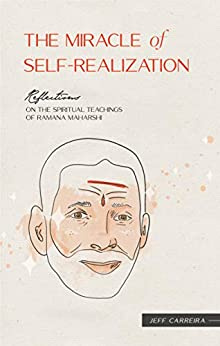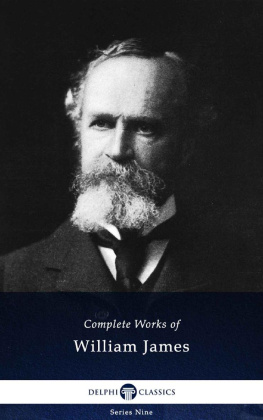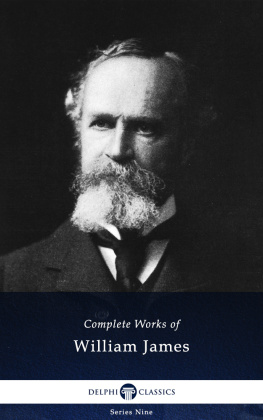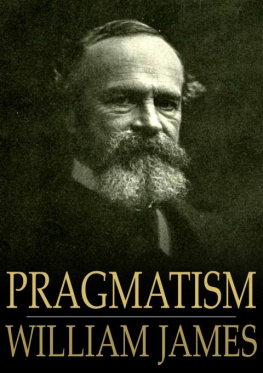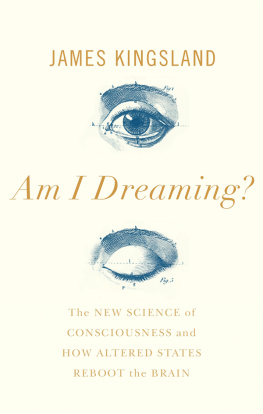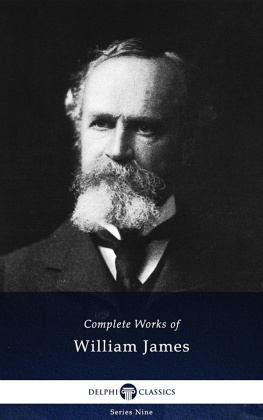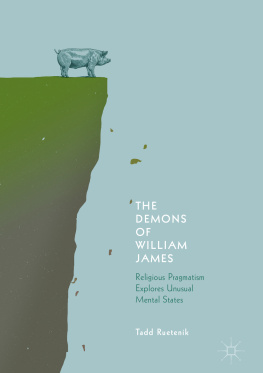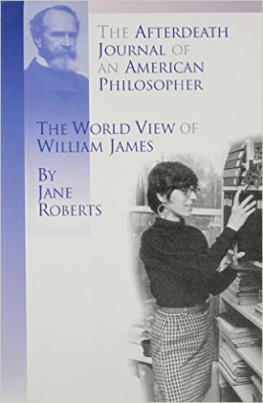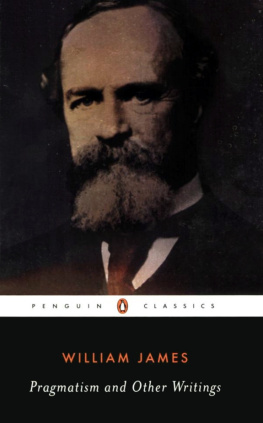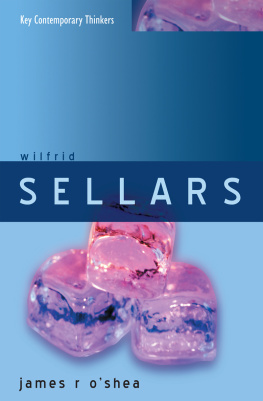Also by Jeff Carreira
Reflections by Jeff Carreira
The Miracle of Self Realization: Reflections on the Spiritual Teachings of Ramana Maharshi
The Miracle of an Open Mind: Reflections on the Philosophy of William James
The Spiritual Implications of Quantum Physics: Reflections on Time, Space, Consciousness, and Paradigm Shifts
The Spiritual Teachings of Jeff Carreira
The Art of Conscious Contentment: A Handbook for Meditation and Spiritual Freedom
The Experience of Luminous Absorption: The Foundation of Spiritual Life
Standalone
Higher Self Expression: How to Become an Artist of Possibility
Online Business for Spiritual Visionaries: Sharing Inner Wisdom as a Successful Entrepreneur
Watch for more at Jeff Carreiras site.
The Miracle of an Open Mind
Reflections on the Philosophy of William James
Jeff Carreira
Emergence Education
Philadelphia, Pennsylvannia
The Miracle of an Open Mind
Reflections on the Philosophy of William James
Copyright 2020
Emergence Education & Jeff Carreira
Printed in the United States of Amercia.
All rights reserved. Except as permitted under U.S. Copyright Act of 1976, no part of this publication may be reproduced, distributed, or transmitted in any form or by any means, or stored in a database or retrieval system, without the prior written permission of the publisher.
ISBN: 978-1-7352650-7-0
Emergence Education
P.O. Box 63767
Philadelphia, PA 19147
EmergenceEducation.com
Cover design by Silvia Rodrigues
Contents
Introduction
N early thirty years ago, I dedicated my life to the spiritual pursuit of awakening. At that time, I quite literally walked away from the life I was living and devoted myself to the attainment of inner peace, wholeness, and fulfillment. After making this monumental decision, I lived in a spiritual practice community and was blessed with experiences of awakening and energetic breakthroughs beyond my wildest dreams. For the past fifteen years, Ive dedicated myself to sharing the fruits of what I have experienced and learned. This book is part of that effort.
Everything I have to teach has been fundamentally shaped by two traditions. The first of those is the Advaita Vedanta tradition of Hinduism. In my earlier book, The Miracle of Self-Realization , I wrote about that part of my intellectual and spiritual heritage and shared my reflections on the teachings of the great Indian mystic, Ramana Maharshi.
In this book, I share what I consider to be the other half of my intellectual and spiritual heritage, the ideas of the pioneering American psychologist and philosopher William James, and the philosophy of Radical Empiricism that he developed.
The ideas of William James have been deeply impactful on my life and my work. In his writings, I encountered a ferocious commitment to maintaining an open mind. And I know from my own experience that the spiritual path demands that we hold our minds open. In order for there to be any chance of radical change in our lives, we must trust that dramatic shifts are possible, even before we have the evidence to prove it. As you will see in this book, William James promoted exactly this kind of faith in extraordinary possibilities.
The teaching work that I do is based largely on the core insight of Advaita Vedanta which tells us that the spiritual goal we seek is already ours. As long as we keep looking elsewhere for what is always already here, we will never find it. Only when we stop looking will we discover that deep peace, wholeness, and fulfillment was always the center of our being.
When people come to work with me, they most often come as seekers searching for deep peace, wholeness, and fulfillment. When they hear me say that these attributes already exist in abundance inside them, they feel inspired, but they seldom trust me enough to stop looking for more.
I teach many things, but the ultimate goal is to inspire people to stop looking long enough, so that they can discover what is already here. It is very difficult to do. People might pause briefly, but almost always the idea that wholeness and fulfillment is already theirs just sounds too preposterous to trust, and soon they go back to seeking.
When I first read William James, I was at the start of my teaching career. What I found was a philosophy that not only shed light on many of my own inexplicable experiences, but also equipped me with powerful ideas created to inspire people to believe in the impossible. I wrote this book because William James has inspired so much of what I now teach.
Before we start, I want you to know that this is not a comprehensive or scholarly examination of James ideas. These are my personal reflections on his work. Within these pages, you will find the insights and realizations that Ive had through my own study of James - a carefully curated set of ideas that have left me with a vibrant understanding of reality and spiritual transformation.
It is a pleasure to share them with you.
Chapter 1
The William James You Might Not Know
M y interest as a meditation teacher has always been to liberate human consciousness from the confines of the current paradigm so that we can give birth to new possibilities and new ways of thinking. In short, Im compelled to support people to keep their minds open to new possibilities. As you will soon see, I feel a close kinship with William James in this because of his deep commitment to an open mind.
Before introducing you to William James, I would like to introduce a few ideas about paradigm shifting and spiritual awakening. You see, without our realizing it, our consciousnesses has become trapped in preestablished patterns of belief that are very difficult to see beyond. There is a wonderful idea that I learned from a spiritual teacher named E.J. Gold, called maze brightness. As I heard it, the idea emerged out of experiments involving rats and mazes. I imagine that, in these experiments, the rodents would learn to navigate through the maze more quickly as they repeatedly hunted down cheese. After each trial run, the layout of the maze was changed, more food added, and the mice try again. The objective would be to see if the mice could learn to find food more quickly over time. From the story as I remember, it seems that, occasionally, a mouse in the trial would undergo an interesting change that was given the name maze brightness. As I picture it, suddenly one of the mice in the maze would stop and look up. Somehow, the mouse had come to realize that it was caught in a trap. It suddenly saw that it was not free.
This mouse had attained maze brightness, which is the mouse equivalent of enlightenment, and the little creature would no longer try to find the cheese in the maze. All the mouse wanted to do now was jump up the wall and get out. Once a mouse realized that the maze was a confinement, and that there was a wider world outside, it was no longer interested in finding cheese; it only wanted to escape.
This is a powerful metaphor for those of us whove had spiritual awakening experiences, and you are probably one of them. In moments of spiritual revelation, we realize that the experience of reality that we are currently living in is also somewhat of a trap. We get a glimpse of just how vast reality extends beyond what we have become familiar with, and some of us become obsessed with the infinite expanse of higher possibilities that we now know exist. The life we have been living no longer captivates us in the same way. Its just not enough anymore. From that point on, there will always be some part of us that is looking for a way to jump up and over the wall. I believe that William James was this type of person, and that is why he has been such a huge inspiration to me.
William James taught psychology and later philosophy at Harvard University. When he taught psychology, one of the students that worked with him was Gertrude Stein, who would become a famous experimental writer and a central figure in the Paris avant-garde art scene of the early twentieth century. James and Stein were very close, and she often described how he demanded that she keep her mind open. As we shall see in this book, James philosophy stressed that we should never close our minds by getting overly fixated on the truth of any single idea at the exclusion of others. In this way, James hoped to teach us to always remain open to new possibilities. To me, that sentiment captures the essence of James intellectual character. Long after Stein had left Harvard, James visited her in Paris to view the magnificent works of art that she and her brother had collected. Stein reports that when James looked at the paintings lining the walls of her flat, he gasped, I told you, he said, I always told you that you should keep your mind open.


